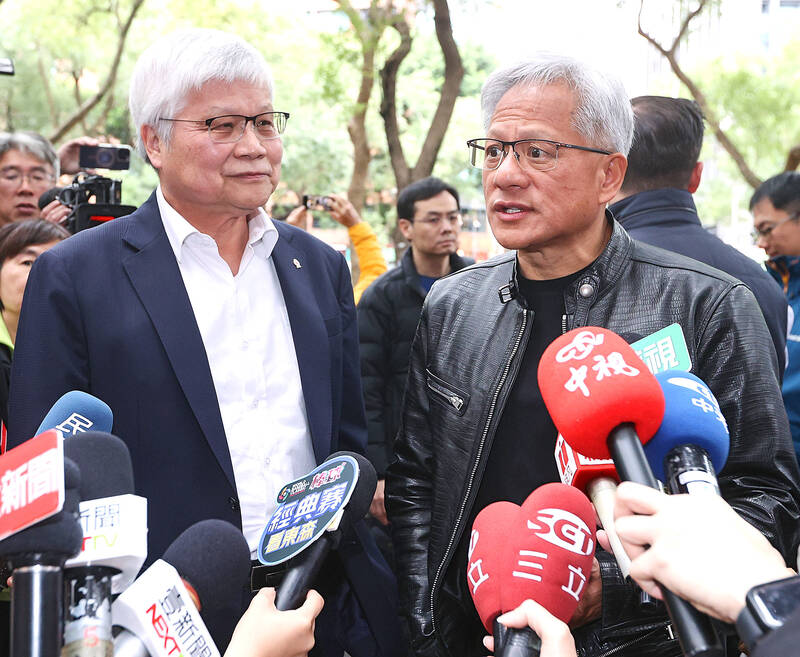Taiwan Semiconductor Manufacturing Co (TSMC, 台積電) and US-based artificial intelligence (AI) chip designer Nvidia Corp have partnered with each other on silicon photonics development, Nvidia founder and CEO Jensen Huang (黃仁勳) said.
Speaking with reporters after he met with TSMC chairman C.C. Wei (魏哲家) in Taipei on Friday, Huang said his company was working with the world’s largest contract chipmaker on silicon photonics, but admitted it was unlikely for the cooperation to yield results any time soon, and both sides would need several years to achieve concrete outcomes.
To have a stake in the silicon photonics supply chain, TSMC and Taiwan-based IC packaging and testing services provider ASE Technology Holding Co (日月光投控) have organized the Silicon Photonics Industry Alliance, which is comprised of more than 30 Taiwanese companies.

Photo: CNA
Silicon photonics is a technology that uses silicon as a medium for optical transmission, which has some promising features, such as low power consumption, extensive transmission distance and lower costs.
At a time when AI applications are booming, finding ways to cut energy consumption has become a focus.
Huang expressed gratitude to all TSMC’s employees for their support for Nvidia, which he said has enabled his company to make a significant improvement in production, as AI applications are in great demand.
Huang also visited several of Nvidia’s business partners in Taiwan.
During the visits, Huang said global demand for Nvidia’s advanced Grace and Blackwell graphics processing units (GPUs) was strong as he also thanked Taiwanese partners for providing about 45 factories to help his company.
He named Nvidia’s partners in expressing his gratitude, including AI server makers Hon Hai Precision Industry Co (鴻海精密), Quanta Computer Inc (廣達電腦) and Wistron Corp (緯創), cloud-enabled services provider Wiwynn Corp (緯穎), AI graphics card vendor Gigabyte Technology Co (技嘉), IC packaging and testing services provider Siliconware Precision Industries Co (矽品精密) and PC component maker Cooler Master Co (訊凱國際).
Nvidia has created GPUs and AI applications, and laid a new foundation for future computer development, Huang said, adding that he believed the AI industry would become the mainstream of the global industrial development, and that the technology would allow machines to learn 24 hours a day to help humans.
He said that now is just the beginning of the AI era, and he expected several trillion US dollars worth of business opportunities to come.
Nvidia has to grow rapidly to meet the trend, but without its Taiwanese partners, which are “working around the clock,” it would be impossible for his company to make it, Huang said.

TRUST: The KMT said it respected the US’ timing and considerations, and hoped it would continue to honor its commitments to helping Taiwan bolster its defenses and deterrence US President Donald Trump is delaying a multibillion-dollar arms sale to Taiwan to ensure his visit to Beijing is successful, a New York Times report said. The weapons sales package has stalled in the US Department of State, the report said, citing US officials it did not identify. The White House has told agencies not to push forward ahead of Trump’s meeting with Chinese President Xi Jinping (習近平), it said. The two last month held a phone call to discuss trade and geopolitical flashpoints ahead of the summit. Xi raised the Taiwan issue and urged the US to handle arms sales to

A magnitude 5.6 earthquake struck off the coast of Yilan County at 12:37pm today, with clear shaking felt across much of northern Taiwan. There were no immediate reports of damage. The epicenter of the quake was 16.9km east-southeast of Yilan County Hall offshore at a depth of 66.8km, Central Weather Administration (CWA) data showed. The maximum intensity registered at a 4 in Yilan County’s Nanao Township (南澳) on Taiwan’s seven-tier scale. Other parts of Yilan, as well as certain areas of Hualien County, Taipei, New Taipei City, Taoyuan, Hsinchu County, Taichung and Miaoli County, recorded intensities of 3. Residents of Yilan County and Taipei received

Taiwan has secured another breakthrough in fruit exports, with jujubes, dragon fruit and lychees approved for shipment to the EU, the Ministry of Agriculture said yesterday. The Animal and Plant Health Inspection Agency on Thursday received formal notification of the approval from the EU, the ministry said, adding that the decision was expected to expand Taiwanese fruit producers’ access to high-end European markets. Taiwan exported 126 tonnes of lychees last year, valued at US$1.48 million, with Japan accounting for 102 tonnes. Other export destinations included New Zealand, Hong Kong, the US and Australia, ministry data showed. Jujube exports totaled 103 tonnes, valued at

BIG SPENDERS: Foreign investors bought the most Taiwan equities since 2005, signaling confidence that an AI boom would continue to benefit chipmakers Taiwan Semiconductor Manufacturing Co’s (TSMC, 台積電) market capitalization swelled to US$2 trillion for the first time following a 4.25 percent rally in its American depositary receipts (ADR) overnight, putting the world’s biggest contract chipmaker sixth on the list of the world’s biggest companies by market capitalization, just behind Amazon.com Inc. The site CompaniesMarketcap.com ranked TSMC ahead of Saudi Aramco and Meta Platforms Inc. The Taiwanese company’s ADRs on Tuesday surged to US$385.75 on the New York Stock Exchange, as strong demand for artificial intelligence (AI) applications led to chip supply constraints and boost revenue growth to record-breaking levels. Each TSMC ADR represents